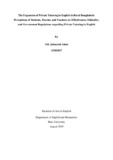| dc.contributor.advisor | Al Amin, Md | |
| dc.contributor.author | Islam, Md. Jubaydul | |
| dc.date.accessioned | 2019-09-19T04:10:48Z | |
| dc.date.available | 2019-09-19T04:10:48Z | |
| dc.date.copyright | 2019 | |
| dc.date.issued | 2019-08 | |
| dc.identifier.other | ID 15303017 | |
| dc.identifier.uri | http://hdl.handle.net/10361/12715 | |
| dc.description | This thesis is submitted in partial fulfillment of the requirements for the degree of Bachelor of Arts in English, 2019. | en_US |
| dc.description | Cataloged from PDF version of thesis. | |
| dc.description | Includes bibliographical references (pages 40-44). | |
| dc.description.abstract | Though the shadow of PT-E (Private Tutoring in English) has been evolving to its best there has not been adequate research on PT-E in Bangladesh. However, in the recent years, PT (Private Tutoring) has engrossed researchers' attention as the government of Bangladesh has imposed some regulations on PT that have been followed by a High Court verdict in support of the government. The government has imposed some uniform policies while English teaching-learning scenarios in Bangladesh are diverse in terms of context and in terms of stakeholders’ responses. Question arises, will these uniform regulations be beneficial to all of the students of Bangladesh, and how does this question can be answered? Hence, based on the specific context of the study, this qualitative research attempts to explore and document the responses of students, parents, and teachers’ perceptions on effectiveness, ethicality & government regulation regarding PT-E. The researcher has interviewed twelve students, five parents, and four teachers from three different institutions of a rural region of Bangladesh to explore their perceptions regarding PT-E. This research has explored that PT-E is beneficial to students as they understand English lectures better in PT class than of school-class lectures, they get chance for regular practice and assessment, and they get individual feedback in private tuition. Parents think their children become more regular and serious in studying English when students take private tuition in English. Teachers believe they can serve better in private tutoring class as less and manageable number of students are taught in each private tutoring batch, and they can put required quality attention to individual students. Most of the participants believe there is nothing unethical in taking private tuition or in doing PT as long as students get the freedom of choosing their private tutor, and the number of students in a batch are between 25-30. Moreover, students, parents, and teachers are satisfied with some of the section of government regulations, however, for having better teaching-learning outcome, they have recommended some changes in those prescribed regulations. | en_US |
| dc.description.statementofresponsibility | Md. Jubaydul Islam | |
| dc.format.extent | 46 pages | |
| dc.language.iso | en | en_US |
| dc.publisher | Brac University | en_US |
| dc.rights | 46 pages | |
| dc.subject | Policy | en_US |
| dc.subject | Feedback | en_US |
| dc.subject | Assessment | en_US |
| dc.subject | Private tutoring | en_US |
| dc.subject | Effectiveness | en_US |
| dc.subject | Ethicality | en_US |
| dc.subject.lcsh | English language--Study and teaching. | |
| dc.title | The expansion of private tutoring in english in rural Bangladesh: perceptions of students, parents, and teachers on effectiveness, ethicality, and government regulations regarding private tutoring in english | en_US |
| dc.type | Thesis | en_US |
| dc.contributor.department | Department of English and Humanities, Brac University | |

